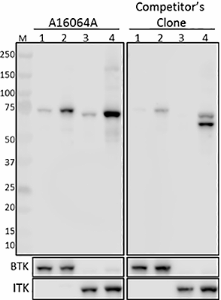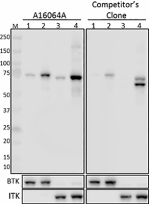- Clone
- A16064A (See other available formats)
- Regulatory Status
- RUO
- Other Names
- BTK: Bruton’s tyrosine kinase, Bruton agammaglobulinemia tyrosine kinase, AGMX1, ATK, IMD1, PSCTK1, XLA, BPK, ITK: Interleukin-2-inducible T-cell kinase, T-cell-specific kinase, EMT, LYK, PSCTK2
- Isotype
- Mouse IgG1, κ
- Ave. Rating
- Submit a Review
- Product Citations
- publications

-

Total cell lysates (15 µg protein) from Ramos cells treated without (lane 1) or with (lane 2) 2 mM H2O2 for 3 minutes, and Jurkat cells treated without (lane 3) or with (lane 4) the same stimulation were resolved by 4-20% Tris-Glycine gel electrophoresis, transferred to nitrocellulose, and probed with 1 µg/mL (1:500) purified anti-BTK Phospho (Tyr551)/ITK Phospho (Tyr512) antibody (Clone A16064A) or a competitor’s clone used at the manufacturer’s recommended concentration. Proteins were visualized by chemiluminescence detection using HRP goat anti-mouse-IgG (Cat No.405301) for Clone A16064A and HRP donkey anti-rabbit IgG (Cat No.406401) for the competitor’s clone. Membranes were then stripped and reprobed with an ITK antibody (Cat No.687302, 1 µg/mL, 1:500 dilution), and again stripped and reprobed with an antibody against BTK to confirm equal loading of the respective proteins. -

Human peripheral blood lymphocytes were treated with (left), or without (right) hydrogen peroxide for 5 minutes, fixed with Fixation Buffer (Cat. No. 420801), permeabilized with Intracellular Staining Permeabilization Wash Buffer (Cat. No. 421002), then stained with CD20 (clone 2H7) APC and purified anti-BTK Phospho (551)/ITK Phospho (Tyr512) (Clone A16064A). Followed by anti-mouse IgG1, κ PE.
| Cat # | Size | Price | Quantity Check Availability | Save | ||
|---|---|---|---|---|---|---|
| 646901 | 25 µg | $112 | ||||
| 646902 | 100 µg | $265 | ||||
Bruton’s tyrosine kinase (BTK) is a Tec family kinase that plays a critical role in B cell development. Upon B cell receptor engagement, BTK translocates to the plasma membrane, where it is transphosphorylated by LYN and SYK kinases at Tyr 551. This initial phosphorylation event is followed by autophosphorylation at Tyr 223. Phosphorylated Tyr 223 is proposed to serve as a docking site for other proteins containing an SH2 domain. Downregulation of BTK activity is achieved through phosphorylation at Ser 180 by PKCβ, which results in reduced membrane recruitment and concomitant transphosphorylation. BTK-mediated B cell receptor signaling is required for B cell survival in the bone marrow and is a therapeutic target for certain B cell malignancies. Mutations in the BTK gene results in X-linked agammaglobulinemia (XLA), a primary immunodeficiency disease characterized by a failure in B cell maturation. Additionally, BTK plays a role in Toll-like receptor signaling in innate immune cells, and has been shown to play a direct role in NLRP3 inflammasome activation, thus contributing to ischaemic brain injury.
IL2-inducible T-cell kinase (ITK) is a tyrosine kinase that is expressed in T cells. It regulates the proliferation, differentiation and development of conventional T cells and NK T cells. Once T cells are activated, a series of phosphorylation events occur leading to the phosphorylation of Tyr 512 in the activation loop by LCK. Subsequent autophosphorylation at Tyr 180 leads to activation of the kinase. Activated ITK can stimulated downstream intracellular calcium mobilization and NFAT nucleus translocation, and in turn, activate T cells. The phenotypes of mice deficient in ITK show severely affected immune response and development.
Product DetailsProduct Details
- Verified Reactivity
- Human, Mouse
- Antibody Type
- Monoclonal
- Host Species
- Mouse
- Immunogen
- Human BTK peptide phosphorylated at Tyr 551.
- Formulation
- Phosphate-buffered solution, pH 7.2, containing 0.09% sodium azide.
- Preparation
- The antibody was purified by affinity chromatography.
- Concentration
- 0.5 mg/ml
- Storage & Handling
- The antibody solution should be stored undiluted between 2°C and 8°C.
- Application
-
WB - Quality tested
ICFC - Verified - Recommended Usage
-
Each lot of this antibody is quality control tested by Western blotting. For Western blotting, the suggested use of this reagent is 0.125 - 2.0 µg/ml (1:250-4000 dilution). For intracellular flow cytometric staining, the suggested use of this reagent is ≤ 0.25 µg per million cells in 100 µl volume. It is recommended that the reagent be titrated for optimal performance for each application.
- Application Notes
-
This clone was initially generated against a BTK peptide sequence containing phospho Tyrosine 551, but was shown to also bind to the highly homologous phospho Tyrosine 512 within the T-cell specific tyrosine kinase ITK. Due to complete conservation of these BTK and ITK phosphosites and the surrounding residues between human and mice, this antibody is predicted to recognize mouse BTK Phospho Tyrosine 551 and mouse ITK Phospho Tyrosine 517.
- RRID
-
AB_2721728 (BioLegend Cat. No. 646901)
AB_2721728 (BioLegend Cat. No. 646902)
Antigen Details
- Structure
-
BTK encodes a 659 amino acid protein with a predicted molecular weight of 76.2 kD. Contains a PH domain (a.a. 1-133) that binds phosphatidylinositol (3,4,5)-triphosphate (PIP3) and polyphosphates, an SH3 domain (a.a. 214-274), an SH2 domain (a.a. 281-377), and a protein kinase domain (402-655).
ITK encodes a 620 amino acid protein with a predicted molecular weight of 71.8 kD. Contains one PH domain (a.a. 4-111) for plasma membrane recruitment, both SH3 (a.a. 171-231) and SH3 (a.a. 239-338) domains, and one protein kinase domain (a.a. 363-615). - Distribution
-
BTK: Cytosol, plasma membrane-associated, B cells
ITK: Cytosol, plasma membrane-associated, T cells - Function
-
BTK: Links B cell receptor engagement with downstream signaling events
ITK: Links T cell receptor engagement with downstream signaling events - Interaction
- ARID3A, BLNK, CAV1, GNAQ, GTF2I, PLGC2, PRKD1, SH3BP5
- Ligand/Receptor
- PIP3
- Biology Area
- Cell Biology, Signal Transduction
- Molecular Family
- Phospho-Proteins, Protein Kinases/Phosphatase
- Antigen References
-
- Yang W, et al. 1997. Proc Natl Acad Sci U.S.A. 94:604.
- Park H, et al. 1996. Immunity. 4:515.
- Lin L, et al. 2009. Biochemistry. 48:2021.
- Heyeck SD, et al. 1997. J. Biol. Chem. 272:25401.
- Nore BF, et al. 2003. Biochim. Biophys. Acta. 1645:123.
- Gene ID
- 695 View all products for this Gene ID 3702 View all products for this Gene ID
- UniProt
- View information about BTK Phospho Tyr551/ITK Phospho Tyr512 on UniProt.org
Related Pages & Pathways
Pages
Related FAQs
Other Formats
View All BTK Phospho (Tyr551)/ITK Phospho (Tyr512) Reagents Request Custom Conjugation| Description | Clone | Applications |
|---|---|---|
| Purified anti-BTK Phospho (Tyr551)/ITK Phospho (Tyr512) | A16064A | WB,ICFC |
| PE anti-BTK Phospho (Tyr551)/ITK Phospho (Tyr512) | A16064A | ICFC |
Customers Also Purchased
Compare Data Across All Formats
This data display is provided for general comparisons between formats.
Your actual data may vary due to variations in samples, target cells, instruments and their settings, staining conditions, and other factors.
If you need assistance with selecting the best format contact our expert technical support team.
-
Purified anti-BTK Phospho (Tyr551)/ITK Phospho (Tyr512)

Total cell lysates (15 µg protein) from Ramos cells treated ... 
Human peripheral blood lymphocytes were treated with (left),... -
PE anti-BTK Phospho (Tyr551)/ITK Phospho (Tyr512)

Human peripheral blood lymphocytes were treated with (left),... 
C57BL/6 mouse splenocytes were treated with (left), or witho...

 Login/Register
Login/Register 











Follow Us